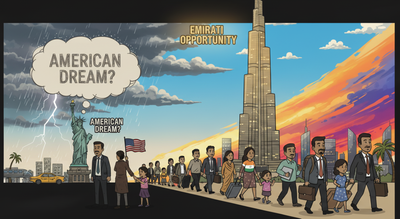It used to be simple. If you were wealthy and ambitious in India, your migration wishlist read like a Western dream: a Green Card in the US, a start-up visa in Canada, or a golden ticket to the EU via Portugal. But in 2025, that map has been redrawn. The hottest new address for India’s rich and restless isn’t Silicon Valley or Lisbon — it’s Dubai. According to Henley & Partners’ Residence Program Index 2025, the UAE’s Residence by Investment, better known as the Golden Visa, is now the second-most enquired residency programme among Indians, behind only Australia’s National Innovation Visa. And that shift says a lot about how migration, money, and ambition are evolving.
The big picture
The data reveals a telling trend. Among the top ten most enquired-about residency programmes by Indian nationals this year are:
- Australia – National Innovation Visa
- UAE – Residence by Investment
- Portugal – Golden Residence Permit Program
- Latvia – Residence by Investment Program
- United States – EB-5 Immigrant Investor Program
- Austria – Citizenship by Investment
- Greece – Golden Visa Program
- Switzerland – Residence Program
- Canada – Start-Up Visa Program
- New Zealand – Active Investor Plus Visa Program
For decades, European schemes and the American Green Card dominated Indian migration choices. But the UAE’s rapid ascent to second place signals a deeper reordering — one rooted in proximity, flexibility, and geopolitical pragmatism.
Driving the news
India is now one of the largest sources of global wealth migration. Henley’s Private Wealth Migration Report 2025 estimates that more than 8,500 high-net-worth individuals (HNWIs) will leave the country this year — a record outflow. The motivations have also evolved. Education and tax efficiency still matter, but climate resilience, healthcare access, global mobility, and political insurance increasingly shape decisions. And the UAE, with its blend of economic dynamism and liberalising residency policies, has positioned itself as the perfect middle ground: global enough to open doors, close enough to feel familiar.
Inside the Golden Visa boom
What the UAE OffersThe Golden Visa is a long-term residence programme — typically valid for 5 or 10 years, renewable, and available to investors, entrepreneurs, skilled professionals, and their families. It allows holders to live, work, and study in the UAE without a local sponsor, while enjoying tax advantages, access to world-class infrastructure, and an enviable geographic position between East and West.In 2025, Indian media exploded with reports of a potential game-changer: a nomination-based “lifetime” Golden Visa allegedly offered to Indian citizens for a one-time fee of AED 100,000 (about ₹23.3 lakh) — without the need for real estate purchases or business investment. Reports suggested that Indian and Bangladeshi nationals were among the first to benefit from this pilot.
Official pushback and clarifications
The UAE’s Federal Authority for Identity, Citizenship, Customs and Port Security (ICP) quickly poured cold water on the frenzy. It denied that lifetime visas were being “sold” and clarified that all Golden Visa applications must go through official government channels, with eligibility still dependent on nomination, merit, and criteria such as professional achievements or economic contributions. A Dubai-based consultancy behind the lifetime visa claims later apologised for causing “public confusion.”The episode highlighted two truths: first, that the UAE is indeed evolving its residency strategy; and second, that the core principle — selection based on merit, not money — remains intact.
Why Indians are lining up
Several structural factors explain why the UAE has leapfrogged older, more established residency programmes:Lower Entry BarriersEven rumours of an AED 100,000 pathway signal a significant reduction in entry costs compared to Portugal’s €250,000 minimum or the US EB-5’s $800,000 investment threshold.Strategic Geography and TiesWith flight times under four hours from major Indian metros and deep trade, energy, and diaspora links, the UAE is both accessible and familiar — a “second home” rather than a distant base.Tax and Lifestyle AppealZero income tax, political stability, a thriving business environment, and world-class infrastructure make the UAE attractive not just as a backup plan but as a base of operations.Talent, Not Just CapitalLike Australia’s Innovation Visa and Canada’s Start-Up programme, the UAE is shifting focus from passive capital to active contributors — professionals, founders, innovators, and experts.Perception MomentumThe media buzz around a simplified, nomination-based route has amplified interest, even if the final policy details are more conservative.
How It compares globally
The UAE’s rise doesn’t mean traditional programmes are losing relevance — but they are losing their monopoly. European golden visas still offer Schengen access but are increasingly expensive and politically sensitive. The US EB-5 remains a coveted route but suffers from long waits and complex compliance. Canada and Australia continue to attract skilled migrants but impose stricter qualifications and relocation requirements.The UAE, meanwhile, offers something few others do: speed, simplicity, flexibility, and proximity — all without the need to uproot one’s life.
The big picture
Migration priorities are shifting: Indians are no longer chasing Western passports for prestige but seeking practical second homes for resilience, mobility, and opportunity.The UAE is rewriting the residency playbook: Its model blends financial incentives with talent attraction, shifting the emphasis from money to merit.Narratives shape decisions: Even disputed media reports have fuelled record interest, illustrating how perception often precedes policy.Competition is heating up: Nations are competing for India’s talent and capital, and the UAE has positioned itself at the centre of that contest.
The bottom line
The UAE’s Golden Visa isn’t just a residency programme — it’s a symbol of how global migration itself is changing. For a growing number of Indian professionals, entrepreneurs, and investors, the goal is no longer a one-way ticket out, but a strategic foothold abroad. And in 2025, nowhere offers that foothold more attractively, or more aggressively, than the Emirates. Go to Source



